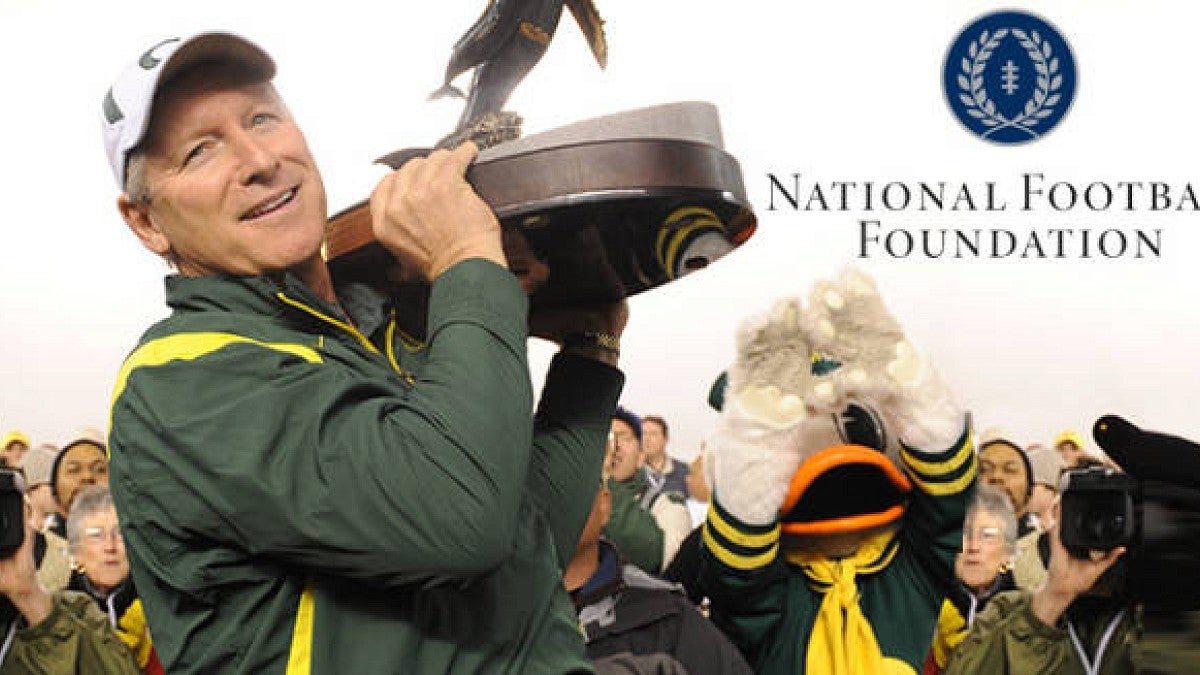For all the rivalry games, bowls and championships won by former UO football coach Mike Bellotti, the most important game of his career might have come in the midst of a 6-5 season that included a five-game losing streak.
Oregon had won three straight to open the 1996 season, Bellotti’s second after being promoted from offensive coordinator. Once Pac-10 play began, however, the Ducks couldn’t find their footing, and dropped five straight.
On Nov. 9, 1996, Arizona was visiting Autzen Stadium. Bellotti spoke confidently that week about the Ducks’ chances of finishing with a winning record. That would require a win over Arizona and two more, which looked unlikely when the Wildcats took an early 14-0 lead. But Oregon rallied to win 49-31, kicking off a three-game win streak to close the year.
Riding that surge of momentum, Oregon went back to a bowl game in 1997. The Ducks would do so in all but one of Bellotti’s remaining 12 years as head coach, just one example of why later this year Bellotti will be inducted into the College Football Hall of Fame.
“I still tell people that game may be the most important game in my coaching career,” Bellotti said. “It took us from a losing streak to a winning streak, into a confidence that, if I put myself out there, my players and coaches would back me up.”
Bellotti’s selection into the Hall of Fame was announced Thursday by the National Football Foundation. He’s one of 16 members of the 2014 class, and the eighth former UO player or coach inducted, following fellow head coaches Hugo Bezdek and Len Casanova.
"Congratulations to Coach Bellotti on being recognized with the most prestigious honor in college football,” UO director of athletics Rob Mullens said. “Mike played an important role in Oregon football history and we are extremely pleased he is being acknowledged for his accomplishments."
Bellotti went 116-55 in his 14 years as head coach; including his time as offensive coordinator, he was part of more than 25 percent of Oregon’s 613 all-time victories entering 2014. He led the Ducks to Pac-10 titles in 2000 and 2001, and a Fiesta Bowl victory to cap the 2001 season, though it's less-heralded triumphs such as the 1996 win over Arizona that still resonate just as strong with Bellotti.
“There are certain plays I can still remember to this day, or players who made a play -- an amazing emotional swing or momentum swing in a game where you said, ‘That's when I knew we had a chance to be a good team or program,’” Bellotti said.
"It's a very humbling experience, because you recognize all the players and all the coaches and all the administrators and all the boosters, at every college I worked at. It's truly an honor, and there's a lot of people I need to think and will thank eventually, either in person or with a little note, something like that."
Bellotti said he felt his strengths included “evaluating people, communicating with people,” calling those traits “probably what’s at the cornerstone of any of my success.”
A graduate of Ygnacio Valley High in Concord, Calif., Bellotti learned the game of football there from Dick Ryan, and also admired his baseball coach, Kent Robie, who became a lifelong friend.
Bellotti played for and then began his coaching career under Jim Sochor at UC Davis. In 1977, Bellotti went to work at Cal State Hayward for Tim Tierney, who instilled in Bellotti an appreciation for recruiting. Bellotti spent six of the next seven years in Hayward, with a one-year interlude in 1979 working at Weber State under Pete Riehlman, from whom Bellotti learned the administrative demands placed on a head coach, and the organizational skills they require.
In 1984, Bellotti took his first head coaching job, at Chico State. He moved to Oregon as offensive coordinator in 1989, under Rich Brooks.
“I enjoyed that, I enjoyed being an offensive coordinator,” said Bellotti, whose offense led the Pac-10 in scoring and passing in 1989, and who helped develop quarterback Danny O’Neil, who took the Ducks to the 1995 Rose Bowl. “That was maybe the most enjoyable part ever of coaching. But you realize that an assistant coach makes a lot of suggestions; a head coach makes decisions. Rich Brooks taught me that.”
With Bellotti making the decisions following Brooks’ departure in 1995, the Ducks went on to their first 10-win season ever in 2000, then won 11 games in 2001. Along the way Bellotti helped groom several assistants who went on to become head coaches, including Chris Petersen, Chip Kelly, Jeff Tedford and Mark Helfrich.
“I learned from every single player and coach I ever worked with,” Bellotti said. “It wasn’t a one-way street of me disseminating information. It was me gathering information from people around me, and hopefully arriving at a path everybody believed they had input into. That made it easier for everyone to follow a plan.”
That philosophy helped foster Oregon’s trademark coaching continuity, with several of Bellotti assistants still working now under Helfrich, including Gary Campbell, Tom Osborne, Steve Greatwood, Don Pellum and John Neal. Not to be overlooked, too, Bellotti said, were all the secretaries and equipment managers and other staff members who helped make his programs run.
All had a hand in Bellotti’s coaching success, and will help him celebrate his Hall of Fame induction.
"It's truly an honor,” Bellotti said. “To every single person involved with the program you want to say, 'Thanks. I'm representing all of you.'"
- by Rob Moseley, GoDucks.com


